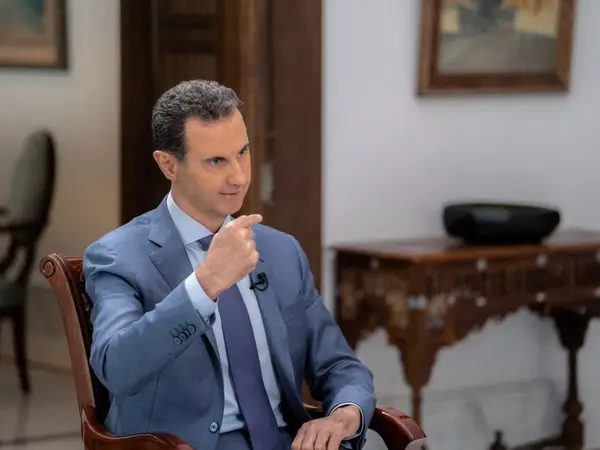In a bizarre claim, Syria’s dictator president, Bashar Assad, says that the support of Iran and Russia has had an important effect on the stability of Syria.
Speaking in a rare interview with Sky News, Assad claimed "the close relations between Syria and Russia and Iran prove that Damascus knows how to choose its friends.,” highlighting the brutal force the three governments employed to crush dissent during the civil war.
The war, which broke out in 2011, rages on with the UN estimating that more than 300,000 civilians were killed in the first decade of the conflict.
During its 12 years, the war has forced more than half of the country's 22 million pre-war population to flee their homes with the civil war a major factor in Europe's migrant crisis.
The governments of Canada and the Netherlands recently filed torture complaints against Syria in the International Court of Justice over the "unlawful killing" of thousands of civilians.
Assad added: “The support of our friends had an important impact on the stability of Syria. The support of Iran and Russia helped Syria to resist the crisis that engulfed the country.”
Syria is far from stable continues to be hugely swayed by both Moscow and Tehran, whose own relationship has also been challenged by the desire to gain a greater foothold in Syria, Iran’s presence only putting Russia’s own troops at risk from Israel attacks as the shadow war between Iran and Israel continues with a major focus on Syria.
Just last week, Iran International reported on new research by Israel’s Alma research institute which shows Iran’s investment into weapons plants in Syria continues, at the expense of the Iranian people suffering the worst economic crisis in decades.
The Alma report claimed: “Iran’s major focus is to develop and manufacture precision missiles and rockets, cruise missiles, and unmanned aerial vehicles (UAVs) on Syrian soil”.
Assad did not refer to the ongoing strengthening of Iran’s proxies on its doorstep, nor the permanent presence of IRGC and Quds forces on Syrian soil during his interview.
This month marks 10 years since then President Obama decided not to bomb Syria after chemical weapons were used against civilians in rebel-held areas. President Assad has now regained control of the capital Damascus and most urban areas.
“We knew from the beginning of the war that this war would be long. It will be and it won't be a temporary crisis - as some thought - but no, no one could have predicted the details,” he told Sky News, seemingly unconcerned that the country has reached the depths of despair, compounded by last year’s tragic earthquake which left over 8,000 civilians dead.
Moving the blame away from his tyrannical regime, Assad pointed the finger at “terrorism” for the country’s destruction. “If we assume that it was the government that started killing and displacing people, then the government is responsible, but terrorism existed and the government was fighting terrorism, it was terrorism that killed, destroyed and burned.,” he claimed.
Soon after anti-regime protests started in early 2011, Assad’s government resorted to use of military force against protesters with Iran’s backing.
The World Bank’s latest report asserts that “although large-scale armed conflict has subsided, Syria continues to rank among the top countries in terms of violent deaths”, noting that “multiple domestic and external shocks are adversely affecting the economy”.
In 2020, it was revealed by a prominent lawmaker that Iran had spent between $20 billion and $30 billion in Syria to prop up President Bashar al-Assad and fight Islamic State but as revelations of Iran’s growing industrial capabilities continue, the true number is believed to be far higher.
“We have probably paid $20-30 billion to Syria, and we have to take that money back,” Heshmatollah Falahatpisheh, a member of the Iranian parliament's national security committee, said in an interview with Etemad Online at the time. Little has changed since, regime activities in Syria seeming to only step up, not down.
In May, Iran International reported that based on leaked documents from the Iranian foreign ministry, that Syria owes Iran $50 billion. Iranians often express strong disapproval of the regime’s regional policy of establishing and supporting militant groups and its involvement in Syria, while inflation has surpassed 50 percent in Iran. Iran’s national currency has fallen 12-fold in the past five years and nearly half of the population lives below the poverty line.
